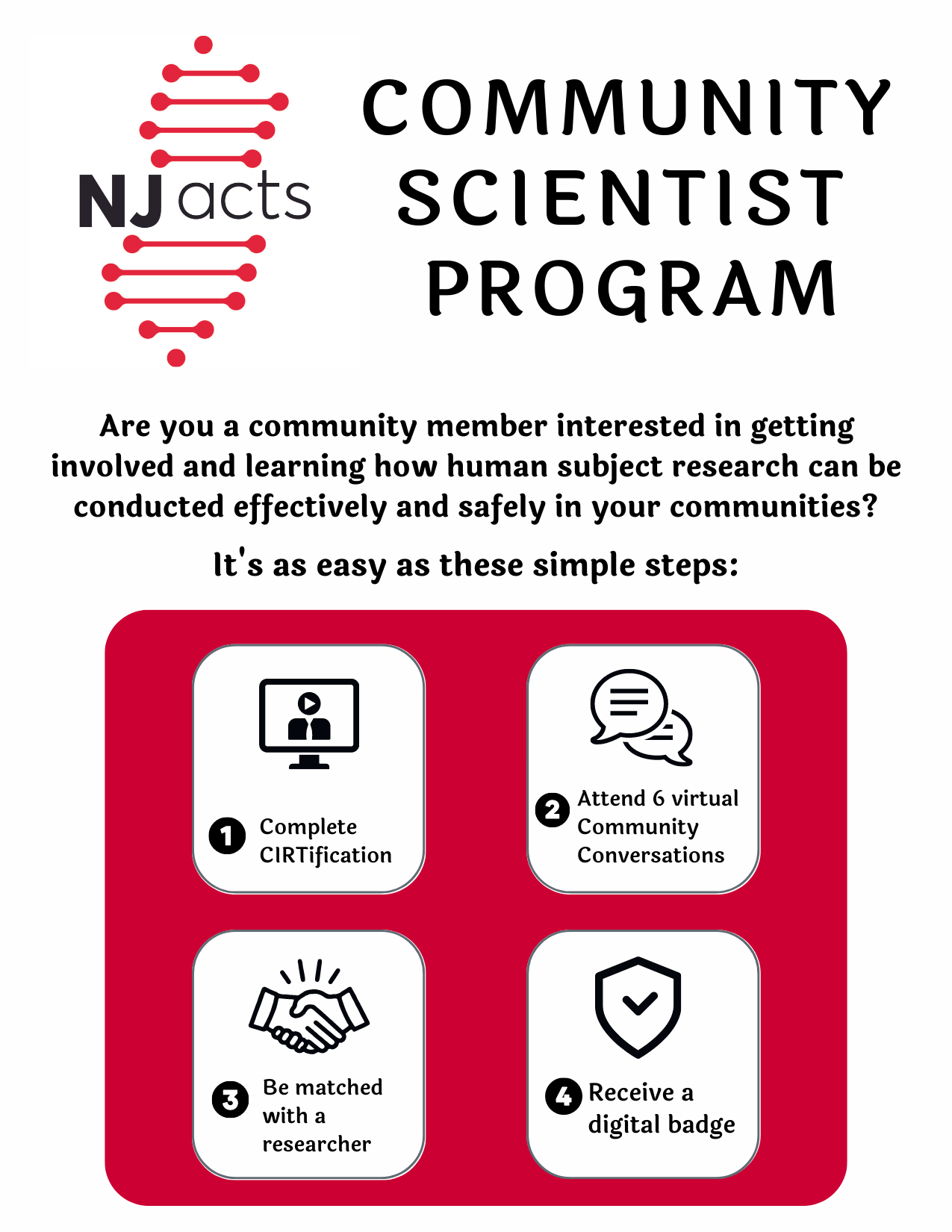180+ networks across 21 NJ counties
COMMUNITY ENGAGEMENT CORE OVERVIEW
NJACTS draws leading academic, industry and community groups together to understand and address the health needs of New Jersey. Central to this is engagement with our community to ensure that our efforts respond to their priorities. Our goal is to conduct research with the New Jersey community, in the community and for the community, and yet, have impact beyond our state’s boundaries.
Stay in Touch!
Join RCommunity!
Join Rutgers Health Service Corps!
Empowering Community-Based Research
Through Cultural and Linguistic Collaboration
- Navigating interpreter-mediated encounters
- Effective translation for research
- Understanding cultural nuances in literacy, trust, and belonging
Through collaboration across disciplines and leveraging expertise within and beyond Rutgers, CrEER ensures that research is inclusive, culturally relevant, and impactful both locally and globally.
👉 Discover how CrEER is shaping the future of community-based research here.
Association for Clinical and Translational Science (ATCS) Membership for Community Members
Did you know that community members are eligible to become members of ACTS through their affiliation with NJ ACTS?
Community members are able to access ACTS’ member benefits, including:
- Discounted registration to the annual Translational Science meeting
- Opportunities to participate in Special Interest Groups and Committees
- Access to the community platform website and more!
Resource for Investigators – CTSA Compendium of D&I Catalogs
Dissemination and implementation (D&I) research focuses on translating evidence-based interventions into real-world settings to improve health outcomes in the broader community.
An open-source CTSA Compendium of D&I Catalogs has been developed by the Clinical & Translational Science Awards (CTSA) Program’s “Advancing Dissemination and Implementation Sciences in CTSAs” working group to support investigators at any stage of their D&I skill-building journey. It provides a curated list of resource catalogs relevant to the conduct of D&I science. The materials include frameworks/theories/models, methods/measures, funding resources, practice resources, training, and health equity resources. Click here to learn more.
CIRTification – A New Alternative to CITI for Community Partners
The rollout of CIRTification at Rutgers has begun. The CIRTification program provides research ethics training alternative for individuals in community organizations, with limited understanding of conducting human research and protecting potential research participants. This option provides training that focuses on establishing the skills in community partners to conduct human subject research effectively and safely in their communities.
To learn more about the program at Rutgers, please visit this link CIRTification.
NJ ACTS COMMUNITY SCIENTIST PROGRAM
This program is designed to provide researchers with rapid feedback from expert community members to ensure their research projects are culturally appropriate and relevant to the community.
PARTICIPATE IN OUR NEXT COHORT!
For more information, please contact njactscommunity@rwjms.rutgers.edu
NJ HEROES TOO
Through the ongoing New Jersey Healthcare Essential Worker Outreach and Education Study – Testing Overlooked Occupations (NJ HEROES TOO), we have gained a wealth of data on COVID-19’s effects, gleaned valuable learnings on attitudes toward testing and vaccines, and improved COVID-19 awareness in underserved communities.

Community Blog

Why Can’t Some People Resist Temptation?
Rutgers Receives $3.7 Million to Study What Leads to Binge Eating and Drinking and Other Harmful Behaviors. Rutgers University has received a $3.7 million grant from the National Institute of Mental Health to explore why some people struggle to resist everyday...
Majority of Americans Experience Some Form of Gun Violence in Person.
Nearly two-thirds of adults in the U.S. have experienced some form of in-person exposure to gun violence, according to a national study by Rutgers researchers tracking racial disparities in direct and media-based experiences. This study, published in the Lancet...

Family Sparks NJIT Scholar’s Research into Biomedical Engineering.
Seeing her father struggle through rehabilitation exercises after a stroke made Marina Samuel '25 think, why can’t therapy be more personalized, effective and efficient for the patient? So, with a central focus on patients, she pursued a bachelor’s in biomedical...
Extreme Monsoon Changes Threaten the Bay of Bengal’s Role as a Critical Food Source.
New research involving Rutgers professors has revealed that expected, extreme changes in India’s summer monsoon could drastically hamper the Bay of Bengal’s ability to support a crucial element of the region’s food supply: marine life. The study, published in Nature...
NJIT Study Probes Genetic ‘Smoking Gun,’ Health Risks of Vaping Among Gen Z.
We all know how bad smoking is for you, but what about vaping? A new study at New Jersey Institute of technology (NJIT) led by forensic anthropologist and biochemist Sara Zapico is exploring the potential long-term health risks of e-cigarettes and how they might...
Measles cases seem to be slowing down in the US. What’s behind it?
About a month ago, the rate of new measles cases was accelerating at a seemingly unprecedented rate with more than 100 infections being confirmed every week. However, over the last couple of weeks, the rate of newly confirmed cases appears to be slowing. The Centers...



